Salman Rushdie Attacker Charged With Attempted Murder
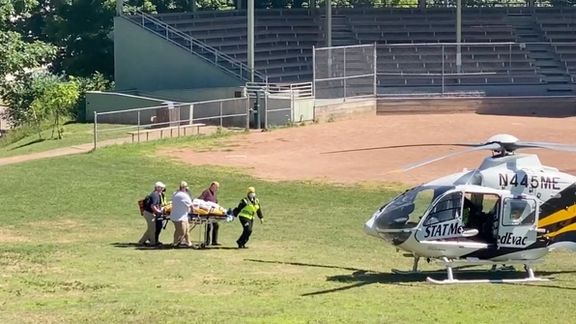
Hadi Matar, the pro-Iran fanatic that stabbed author Salman Rushdie at an event in New York state, has been charged with attempted murder and is being held without bond.

Hadi Matar, the pro-Iran fanatic that stabbed author Salman Rushdie at an event in New York state, has been charged with attempted murder and is being held without bond.
Chautauqua County district attorney, Jason Schmidt, said on Saturday that Matar, a 24-year-old man from Fairview, New Jersey, was arraigned late on Friday, accused of attempted murder in the second degree and assault in the second degree.
Schmidt said state and federal law enforcement agencies, including in New Jersey, were working to understand the planning and preparation which preceded the attack and determine whether additional charges should be filed.
Rushdie, who spent years in hiding after Iran urged Muslims to kill him over his novel "The Satanic Verses", was stabbed in the neck and torso on stage at a lecture on Friday. According to NBC New York, Matar was sympathetic to Shiite extremism and Iran's Islamic Revolutionary Guard Corps (IRGC).
Iran’s Kayhan daily linked to Iran’s Supreme Leader said “a thousand bravos” to the man who attacked Salman Rushdie, implying that his throat should have been cut.
The Iranian government has not officially reacted to the stabbing of the renowned writer who has been haunted for 33 years by a death edict issued by Iran’s former leader Ruhollah Khomeini. His book, the Satanic Verses was deemed as blasphemy against Islam’s Prophet Muhammad.
Iran International reported on Friday that Mohammad Marandi, an American-born academic who has acted as a spokesman-cum-advisor for Iran in nuclear talks in Vienna, tweeted he would not be “shedding tears for a writer who spouts hatred & contempt for Muslims & Islam.”
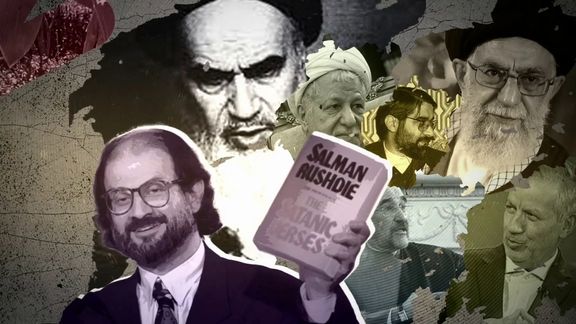
A newspaper in Iran closely affiliated with the country’s ruler Ali Khamenei has called the assassination attempt on author Salman Rushdie “divine vengeance”.
Iran’s government and top officials have not reacted to the attack in New York on Friday. While the hardliner media have welcomed the move implicitly or even openly, praising the assailant. Kayhan daily linked to the Supreme Leader, for instance on Saturday said “a thousand bravos” to the man who attacked Rushdie, implying that his throat should have been cut. In its Sunday edition, the paper said, “divine vengeance befell Salma Rushdie” and predicted that former US President Donald Trump and his Secretary of State Mike Pompeo are next.
Some Iranian media and political figures have adopted a different tact accusing opponents of the revival of the 2015 nuclear deal of using the attack on Salman Rushdie as a means of sabotaging a possible nuclear agreement.
Proponents of the conspiracy theory claim there is a possible involvement of Iran’s opponents, particularly Israel, who want to discredit the Iranian government and sabotage agreement on the revival of the Joint Comprehensive Plan of Action (JCPOA) and lifting of US sanctions.
Hardliner Mohammad Marandi who has acted as a spokesman-cum-advisor of the Iranian negotiators in Vienna nuclear talks, tweeted that he would not be shedding tears “for a writer who spouts hatred and contempt for Muslims and Islam” but went on to ask if it “isn’t odd that as we near a potential nuclear deal, the US makes claims about a hit on Bolton... and then this happens?”

“I'm not an exponent of conspiracy theories, but simultaneousness of the news about plans to assassinate [John] Bolton and the attack on Rushdie with the finalization of talks to restore the JCPOA isn’t not credible to me,” reformist' politician and commentator Abbas Abdi who is an ardent critic of the Raisi government, tweeted.
It is quite possible that the recent ‘plots’ against US officials and citizen as well as Rushdie were organized by the Israeli intelligence to prevent diplomatic solutions to the disputes between Tehran and Washington, Reza Nasri, a commentaor said in a tweet while in a commentary Saturday the conservative Alef news website said the West would devise ‘propaganda scenarios’ against Iran revolving around the attack on Rushdie.
Others on social media have seen these statements as an attempt by Iran to create confusion to deflect blame for a death fatwa issued 34 years ago against Rushdie that could have led to the Friday knife attack.
The 15 Khordad Foundation, a charity organization that put the multi-million-dollar bounty on Rushdie’s head in 1989 and even increased it by half a million to $3.3 million in 2012, has so far remained silent about the assassination attempt.
Hadi Matar (24), the suspect in the stabbing of Rushdie at an event in New York state, has now been charged with attempted murder and is being held without bond, prosecutors in Chautauqua County said on Saturday.
A preliminary law enforcement review of Matar's social media accounts showed he was sympathetic to Shi'ite extremism and Iran's Islamic Revolutionary Guard Corps (IRGC), although no definitive links had been found, according to NBC New York.
In the US, Republicans have demanded that the Biden administration must put an end to negotiations with Iran in view of the terrorist act against Rushdie sanctioned by Khomeini's fatwa as well as the alleged recent Iranian plots against US officials and citizens including John Bolton, Mark Pompeo, and Masih Alinejad, an Iranian American activist.
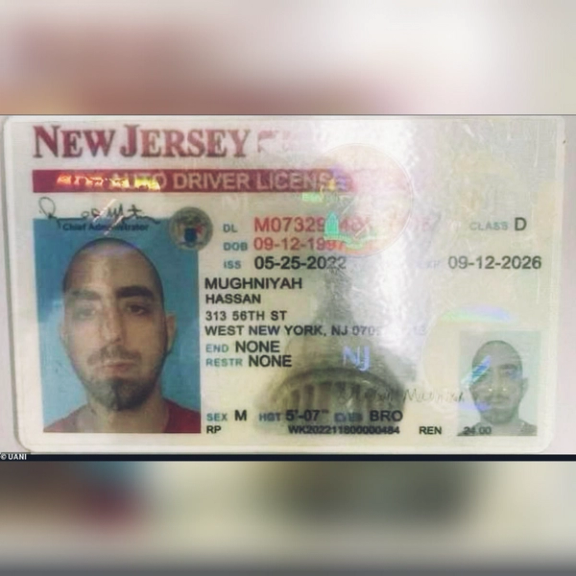
The suspect in the attack on Salman Rushdie was sympathetic to Shi'ite extremism and Iran's Islamic Revolutionary Guard Corps (IRGC), NBC New York cited law enforcement sources as saying on Saturday.
Rushdie, who spent years in hiding after Iran urged Muslims to kill him over his novel "The Satanic Verses", was stabbed in the neck and torso on stage at a lecture on Friday.
Police have identified the suspect in custody as Hadi Matar, a 24-year-old man from Fairview.
A preliminary law enforcement review of Matar's social media accounts showed he was sympathetic to Shi'ite extremism and IRGC causes, NBC New York reported.
Matar was born in California and recently moved to New Jersey, the NBC New York report said, adding that he had a fake drivers license on him.
NBC New York said the official told it that there were no definitive links established to the IRGC, but the initial assessment indicated the suspect was sympathetic to the Iranian government group.
There has been no official government reaction in Iran to the attack on Rushdie, but several hardline Iranian newspapers expressed praise for his assailant.
Ali Tehfe, mayor of Yaroun in the south of Lebanon, said that the suspect was the son of a man from the town. The suspect's parents emigrated to the United States, and he was born and raised there, the mayor added, but said he had "no information at all" on their political views.
An official from Hezbollah told Reuters that the Iran-backed Lebanese armed group had no additional information on the attack on Rushdie.
Reporting by Reuters
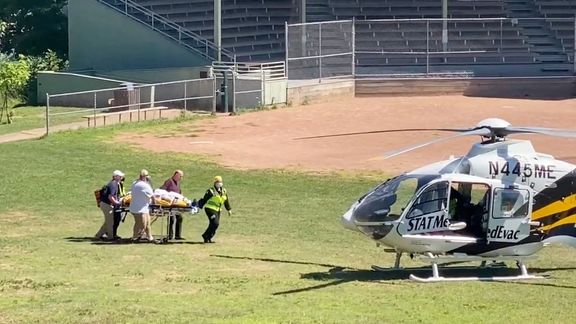
Iran’s Kayhan daily linked to the Supreme Leader said “a thousand bravos” to the man who attacked Salman Rushdie, implying that his throat should have been cut.
Kayhan is known to be close to Supreme Leader Ali Khamenei’s office and its firebrand editor, Hossein Shariatmadari, is Khamenei’s appointee and representative at the flagship ultra-conservative paper.
The Iranian government has not officially reacted to the stabbing of the renowned writer who has been haunted for 33 years by a death edict issued by Iran’s former leader Ruhollah Khomeini. His book, the Satanic Verses was deemed as blasphemy against Islam’s Prophet Muhammad.
Government media in their reporting did not condemn or express dismay at the attack seriously injuring Rushdie, who has probably lost one eye and is still not out of danger.
“The news is not good,” Andrew Wylie, Rushdie’s representative announced. “Salman will likely lose one eye; the nerves in his arm were severed; and his liver was stabbed and damaged.”
The official government news website IRNA praised a man who in the past had tried to kill the British-American author and indirectly praised Friday’s attacker Hadi Matar. Government media also published articles trying to justify Khomeini’s fatwa condemning Rushdie to death and used words like “apostate” to describe him.
Iran International reported on Friday that Mohammad Marandi, an American-born academic who has acted as a spokesman-cum-advisor for Iran in nuclear talks in Vienna, tweeted he would not be “shedding tears for a writer who spouts hatred & contempt for Muslims & Islam.”
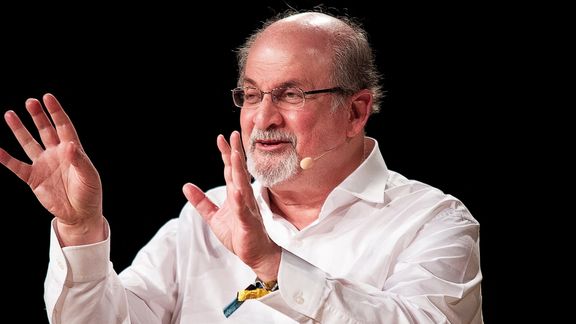
Marandi called Rushdie a “pawn of empire” and suggested it was “odd” the attack should occur just as agreement on restoring the 2015 Iran nuclear deal was “near.”
The Asr Iran news site on Saturday carried an often-cited quote by Khamenei that said the "arrow" shot by Khomeini "will one day hit the target".
The headline of the hardline Vatan Emrooz newspaper read: “Knife in Salman Rushdie’s neck”.
The Khorasan daily carried the headline: “Satan on the way to hell”.
Although US law enforcement agencies have not assigned a motive to the attacker, Fox news published a photo of his fake New Jersey driver’s license that bore the name Hassan Mughniyeh. This can offer a clue to his motive. Imad Mughniyeh was a wanted Hezbollah terror operative who was assassinated in Syria in 2008. Other reports alleged that Matar’s social media accounts show his support for the Iranian brand of Shiite causes, including support for the Revolutionary Guard.
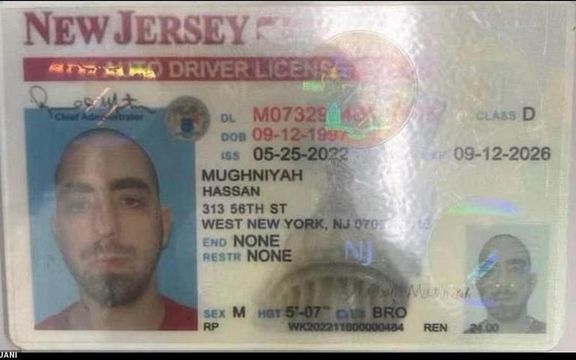
Pro-Iran and Pro-Hezbollah social media feeds began praising Matar, who was is said to have Lebanese roots, but there is still no information about his family history. One account described him as a “Lebanese hero who stabbed Satan Salman Rushdie,” according to Algemeiner.
While it is not clear if his religious beliefs led him to attack Rushdie or if he had links to any militant group, Iran’s long-standing edict to eliminate Rushdie could be a motivating force for religious extremists.
Matar who grew up in California is said to be a devout Muslim. The Daily Beast quoted a former classmate, Gabrial Sanchez as saying that while in school Matar “was a very devout Muslim,” but he never spoke about Rushdie or Iran.
The Daily Beast also reported that Matar apparently took up boxing training in April at a club. He also obtained his fake drivers license in May, which could point to some degree of planning for a violent or illegal act similar to what he eventually did on Friday.
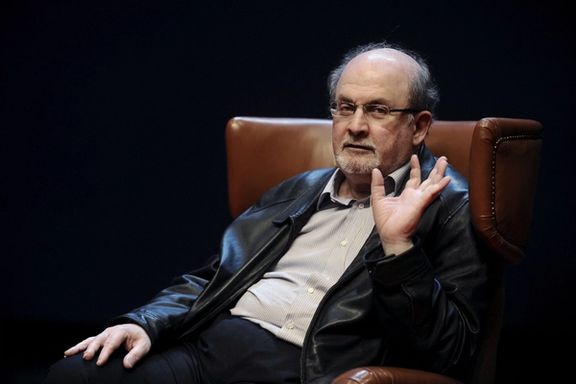
Author Salman Rushdie was on a ventilator in Erie, Pennsylvania, Saturday after being knifed at a literary event in New York state.
“The news is not good,” Andrew Wylie, Rushdie’s agent, said late Friday. “Salman will likely lose one eye; the nerves in his arm were severed; and his liver was stabbed and damaged.”
Rushdie, the subject of a ‘death sentence’ issued by Iranian leader Ruhollah Khomeini in 1989, was airlifted to hospital after being stabbed repeatedly at around 11am local time as he was about the deliver a lecture at the Chautauqua Institution, New York state.
Police reported that a state trooper at the event took the attacker into custody after what witnesses said was an assault lasting 20 seconds. An endocrinologist in the audience told the New York Times that Rushdie had multiple stab wounds, including one to the right side of his neck.
Police later named the suspect as Hadi Matar, a New Jersey resident aged 24, and said they were investigating his motive.
While the official news agency IRNA reported the attack only briefly, Mohammad Marandi, an American-born academic who has acted as a spokesman-cum-advisor for Iran in nuclear talks in Vienna, tweeted he would not be “shedding tears for a writer who spouts hatred & contempt for Muslims & Islam.”
Marandi called Rushdie a “pawn of empire” and suggested it was “odd” the attack should occur just as agreement on restoring the 2015 Iran nuclear deal was “near.”
Fuel to the flames
Khomeini’s edict was February 14, 1989, after the publication of Rushdie’s third novel, The Satanic Verses. While the book had already produced protests in Islamabad, Pakistan, in which at least six people died, Khomeini’s ‘fatwa’ added fuel to the flames, with widespread protests.
While Rushdie went into hiding for six years, his Japanese translator Hitoshi Igarashi was stabbed to death in 1991, while his Italian translator survived a knife attack the same year. Tehran’s Behesht Zahra cemetery has a shrine for Mustafa Mahmoud Mazeh, born in Guinea, was died in London in August 1989 when priming a book bomb in London apparently for an attack on Rushdie.
Reformist president Mohammad Khatami in 1998 assured London that the Iranian authorities would not assist anyone attempting to carry out the death sentence. But Ali Khamenei, who succeeded Khomeini in 1989 as supreme leader, made clear on several occasions the edict remained in force.
Best foreign novel
Ironically, Khamenei, when president in 1985, had announced Iran’s award of its best foreign novel prize for Rushdie’s third novel, Shame. But Iran’s leader has not wavered over Khomeini’s edict, including endorsing it in a tweet in 2019, which led to the temporary suspension of his account.
Semi-official bodies have never forgotten Rushdie. In 2012, it was widely reported that the 15 Khordad Foundation, a quasi-official religious body in Iran, had increased an existing bounty offered for killing the novelist from $2.8 million to $3.3 million, an amount raised by $600,000 by Iranian media bodies in 2016.
Iran Daily in February praised the “deep understanding, true attitude and reliable future vision” of Khomeini in issuing the edict, which had encouraged Muslims to show that “if they are led properly, can be the pioneers of the revival of religious values and stand up against the hatred spread by the West against Muslims.”
Rushdie, who was born in Kashmir and grew up a Muslim, has lived in New York for the past 20 years. When he was knighted by the British Queen Elizabeth in 2007, Ayman al-Zawahiri, the al-Qaeda leader killed July 31 by an American drone stroke in Kabul, promised “a very precise response.”
‘Stupidly optimistic’
In an interview last year with the Guardian newspaper, Rushdie called himself “stupidly optimistic”and suggested the “first people to suffer” from “censorship…are underprivileged minorities.”
“One thing I feel, well, proud of, let’s say, is if you knew nothing about my life, if all you had were my books, I don’t think you would feel that something traumatic happened to me in 1989,” Rushdie said. “I’m glad I had the brains to think, in the middle of all that, I don’t want to be the victim of this. I could write frightened or revenge books, and both would make me a creature of the event. So, I thought, Be the writer that you want to be.”
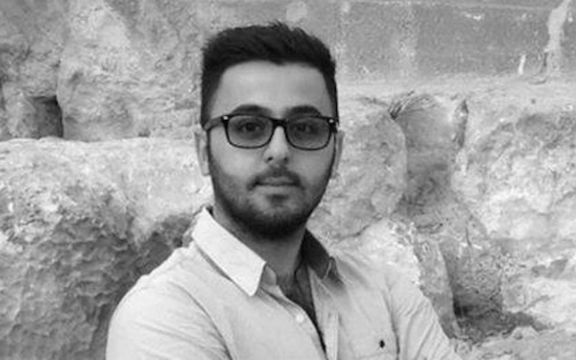
A Jewish Israeli woman who is accused of spying for Iran has attempted suicide and is now hospitalized in critical condition.
The woman, who was arrested for spying for Iran in December, attempted to take her own life while under house arrest at her home in Holon on Thursday, Hebrew media reported. Paramedics arrived at her home and found that she had tried to overdose on pills.
The Shin Bet security service said in January that five Jewish Israelis had been detained on charges of assisting an Iranian operative in gathering intelligence and making connections in Israel. The operative, going by the name of Rambod Namdar, maintained profiles on social media sites and pretended to be Jewish. What could be more worrying for the Israeli authorities is that some of the suspects seem to have known or suspected that Namdar was an Iranian operative, but agreed to cooperate for small sums of money, ranging from $900 to $5,000, a Shin Bet official said at the time.
Two of the suspects -- all of Iranian heritage -- include the woman from Holon and her husband, whose names are barred from publication. The wife, who worked as a presenter at a radio station, was in contact with Namdar and passed along photos of government offices over the course of several years, while her husband was accused of being aware of the connection, speaking with the Iranian operative himself, as well as transporting her to the US Consulate to photograph it.
The husband denied the accusations during an interview with Channel 12 news on Thursday evening following his wife’s suicide attempt, and accused the Shin Bet of extracting a false confession from her, saying, “For the past eight months, our life has turned into hell.”